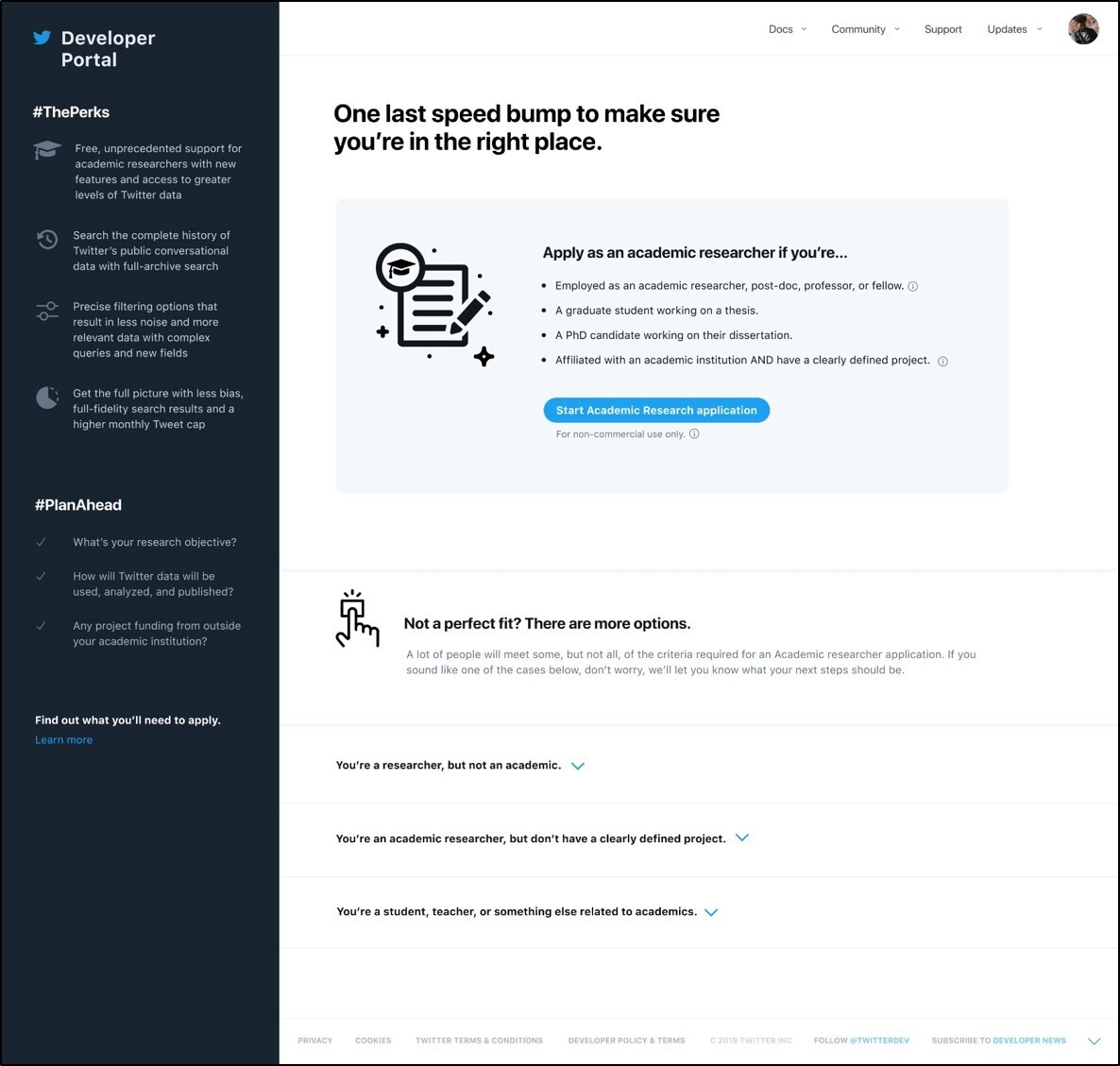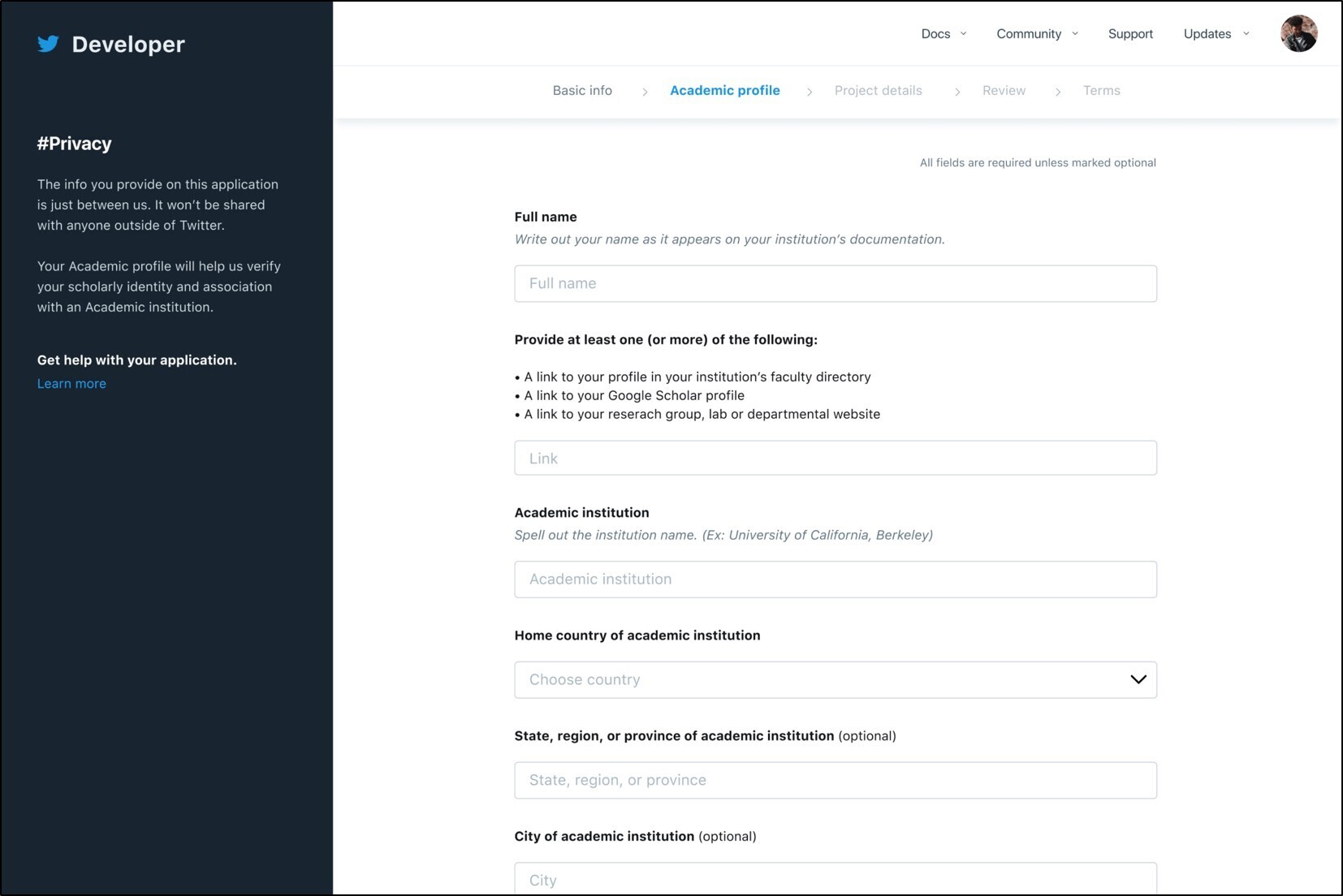Product News
Enabling the future of academic research with the Twitter API
By Adam Tornes 26 January 2021
By Adam Tornes
26 January 2021

When we introduced the next generation of the Twitter API in July 2020, we also shared our plans to invest in the success of the academic research community with tailored solutions that better serve their goals. Today, we’re excited to launch the Academic Research product track on the new Twitter API.
Why we’re launching this & how we got here
Since the Twitter API was first introduced in 2006, academic researchers have used data from the public conversation to study topics as diverse as the conversation on Twitter itself - from state-backed efforts to disrupt the public conversation to floods and climate change, from attitudes and perceptions about COVID-19 to efforts to promote healthy conversation online. Today, academic researchers are one of the largest groups of people using the Twitter API.
Our developer platform hasn’t always made it easy for researchers to access the data they need, and many have had to rely on their own resourcefulness to find the right information. Despite this, for over a decade, academic researchers have used Twitter data for discoveries and innovations that help make the world a better place.
Over the past couple of years, we’ve taken iterative steps to improve the experience for researchers, like when we launched a webpage dedicated to Academic Research, and updated our Twitter Developer Policy to make it easier to validate or reproduce others’ research using Twitter data.
We’ve also made improvements to help academic researchers use Twitter data to advance their disciplines, answer urgent questions during crises, and even help us improve Twitter. For example, in April 2020, we released the COVID-19 stream endpoint - the first free, topic-based stream built solely for researchers to use data from the global conversation for the public good. Researchers from around the world continue to use this endpoint for a number of projects.
Over two years ago, we started our own extensive research to better understand the needs, constraints and challenges that researchers have when studying the public conversation. In October 2020, we tested this product track in a private beta program where we gathered additional feedback. This gave us a glimpse into some of the important work that the free Academic Research product track we’re launching today can now enable.
“The Academic Research product track gives researchers a window into understanding the use of Twitter and social media at large, and is an important step by Twitter to support the scientific community.”
- Dr. Sarah Shugars, Assistant Professor at New York University
“Twitter's enhancements for academic research have the potential to eliminate many of the bottlenecks that scholars confront in working with Twitter's API, and allow us to better evaluate the impact and origin of trends we discover.”
- Dr. David Lazer, Professor at Northeastern University
What’s launching today
With the new Academic Research product track, qualified researchers will have access to all v2 endpoints released to date, as well as:
- Free access to the full history of public conversation via the full-archive search endpoint, which was previously limited to paid premium or enterprise customers
- Higher levels of access to the Twitter developer platform for free, including a significantly higher monthly Tweet volume cap of 10 million (20x higher than what’s available on the Standard product track today)
- More precise filtering capabilities across all v2 endpoints to limit data collection to what is relevant for your study and minimize data cleaning requirements
- New technical and methodological guides to maximize the success of your studies
The release of the Academic Research product track is just a starting point. This initial solution is intended to address the most requested, biggest challenges faced when conducting research on the platform. We are excited to enable even more research that can create a positive impact on the world, and on Twitter, in the future.
For more in-depth details about what’s available, see our post on the Twitter community forum.
Where do I start?
To use this track, new and existing Twitter developers will need to apply for access with the Academic Research application.

An improved developer portal experience guides you to the product track that best fits your needs.
We require this additional application step to help protect the security and privacy of people who use Twitter and our developer platform. Each application will go through a manual review process to determine whether the described use cases for accessing our Academic Research product track adhere to our Developer Policy, and that applicants meet these three requirements:
- You are either a master’s student, doctoral candidate, post-doc, faculty, or research-focused employee at an academic institution or university.
- You have a clearly defined research objective, and you have specific plans for how you intend to use, analyze, and share Twitter data from your research. Learn more about the application.
- You will use this product track for non-commercial purposes. Learn about non-commercial use.
We understand that these requirements are not representative of everyone doing academic research with Twitter data (for example, if you are an undergraduate, independent researcher, or a non-profit). Our future goal is to serve the complete range of research use cases for public Twitter data. In the meantime, anyone can apply to start with our v2 endpoints on the Standard product track.

The new application for the Academic Research track asks specific questions related to your academic profile and research project details. Learn more about the application here.
What’s next for the Twitter API v2?
Today’s launch marks the beginning of how we plan to support this community with unprecedented access to data that can advance research objectives for nearly any discipline. While we recognize what we’re launching today may not address all needs of the community, this is a starting point and we are committed to continued support for academic researchers in the future. We’ll continue to listen and learn from you all, and welcome your feedback on how we can continue to improve and best serve your needs.
As we’ve seen over the last 15 years, the research topics that can be studied with Twitter data are vast, and the future possibilities are endless. We hope you are as excited as we are about the possibilities this new product track creates for your research.
In coming months, we will introduce a specialized Business product track, as well as additional levels of access within our Academic Research, Standard, and Business product tracks. We are also exploring more flexible access terms, support for additional Projects with unique use cases within your product track, and other improvements intended to help researchers and developers to get started, grow, and scale their projects all within the same API. To follow our planned releases, check out the product roadmap.
Eventually, the new Twitter API will fully replace the v1.1 standard, premium, and enterprise APIs. Though before that can happen, we have a lot more to build, which is why we are referring to today’s launch as Early Access. Early access gives you a chance to get started and get ahead on using our new, v2 endpoints. Learn more about how we plan to roll out the new Twitter API here.
- Have questions or want to connect with other researchers using the Twitter API? Check out our academic research community forum.
- Have ideas about how we can improve the new Twitter API? Upvote ideas or add your own in the v2 API feedback channel.